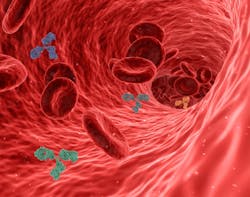Beckman Coulter launches semi-quantitative SARS-CoV-2 IgG assay
Beckman Coulter has launched its Access SARS-CoV-2 IgG II assay that measures a patient’s relative level of antibodies in response to a previous SARS-CoV-2 infection, according to a company press release.
The new capabilities of the assay enable clinicians to establish a baseline to evaluate an individual’s immune response to the SARS-CoV-2 virus based on a numerical value and assess relative changes of an individual’s immune response to the virus over time, Beckman Coulter said.
The organization is filing for emergency use authorization (EUA) of the assay with the U.S. Food and Drug Administration (FDA) and will immediately begin shipping assays to its customer base throughout the United States. Beckman Coulter is also planning to make the assay available to markets accepting the CE Mark before the end of the year.
The Access SARS-CoV-2 IgG II semi-quantitative assay provides a numerical result in Arbitrary Units (AU) from 2.00- 450 AU/mL1 as well as a qualitative result. The assays use the receptor-binding domain (RBD) of the spike protein. Beckman Coulter selected the RBD of the spike protein as it is critical for viral entry into human cells and has been shown to be the target for neutralizing antibodies in a surrogate model. The company said the selection is also aligned with the multiple vaccines in development that target or include the RBD of the spike protein, with the goal of producing protective antibodies.
The test has a confirmed 96 percent positive percent agreement (PPA, sensitivity) at 8-14 days post symptom onset and 99.9 percent negative percent agreement (NPA, specificity) evaluated in a study with 1,448 samples from donors in the United States and France collected prior to December 2019, Beckman Coulter said. It uses immobilized virus antigens on magnetic particles to capture IgG antibodies from patient serum or plasma samples and reveals them using labelled anti-IgG antibodies.

